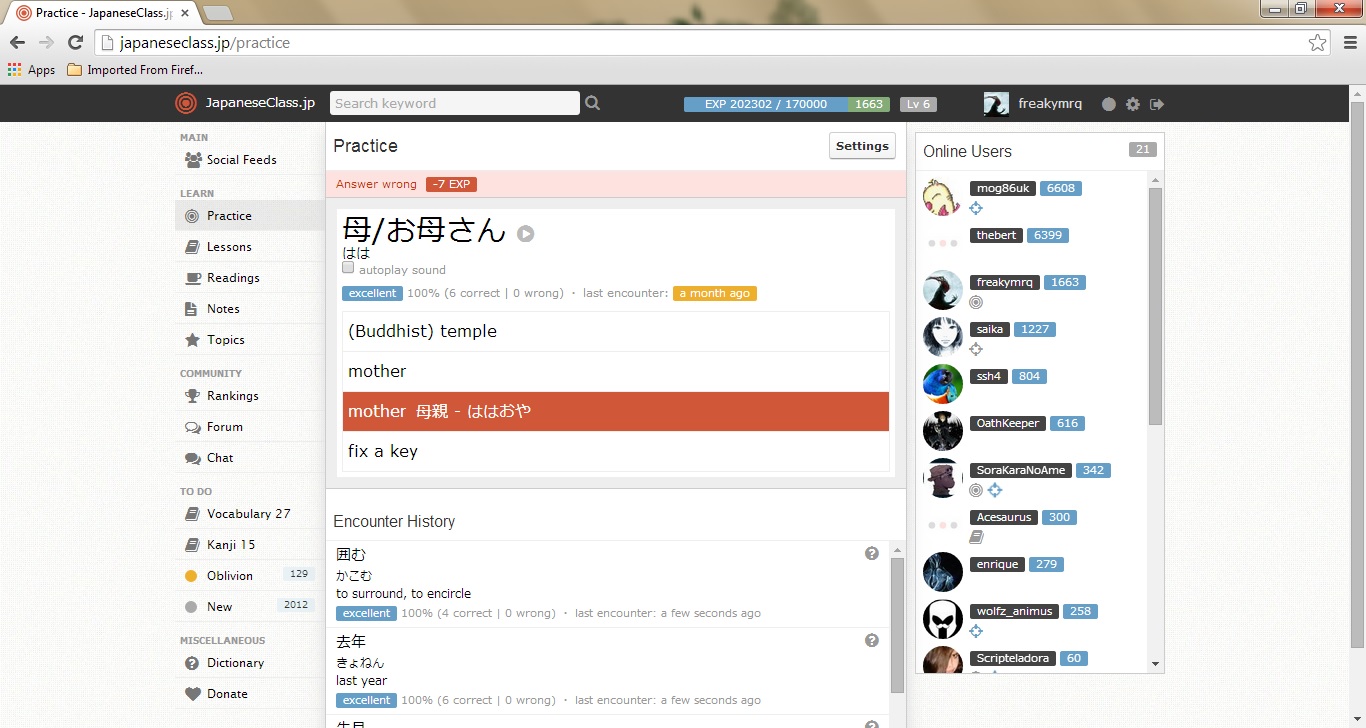Comments 12
 :|June 23, 2014 at 11:59am
:|June 23, 2014 at 11:59am D:June 23, 2014 at 1:39pm
D:June 23, 2014 at 1:39pm :(June 23, 2014 at 2:28pm
:(June 23, 2014 at 2:28pm X-XJune 23, 2014 at 3:02pm
X-XJune 23, 2014 at 3:02pm ∑(゚д゚lll)ガーン 同じじゃん!!June 24, 2014 at 12:40am
∑(゚д゚lll)ガーン 同じじゃん!!June 24, 2014 at 12:40am お母様(おかあさま)、母上(ははうえ)、かーちゃん are also OK lolJune 24, 2014 at 12:41am
お母様(おかあさま)、母上(ははうえ)、かーちゃん are also OK lolJune 24, 2014 at 12:41am never heard of 母上 before but I guess just another mother synonym added to my knowledge ha haJune 24, 2014 at 1:56am
never heard of 母上 before but I guess just another mother synonym added to my knowledge ha haJune 24, 2014 at 1:56am Unlucky. :(
Unlucky. :(
At least the answers appeared next to eachother, so you would've had a bit more chance of noticing--at least if you were already aware that, for vocabulary, two identical answers aren't both regarded as correct.
This question also seems difficult to give separate definitions to each word. In JCJP「母/お母さん」and「 母親」are the only two vocabulary words for mother. I think one distinction is that 母/お母さん is a term of address used instead of the mother's own name, whereas 母親 is a descriptive noun 'a mother'?
I have definitely heard 父上(ちちうえ)used in anime and games, so I guess 母上 is used too although I don't think I've heard it before.June 24, 2014 at 2:39am 母上 is also common in animes, especially in older times or richer families.June 24, 2014 at 3:07am
母上 is also common in animes, especially in older times or richer families.June 24, 2014 at 3:07am Yep, you all have very good senses of Japanese.(Is that right? lol)
Yep, you all have very good senses of Japanese.(Is that right? lol)
We don't say the first two, but some people use the last one.
母上 is used in a history drama(時代劇).
お母様 is used by a few people in high society, but I've never met the person before lol
かーちゃん is very casual, so it seems that the person live in an old downtownJune 24, 2014 at 10:45pm @モグモグさん、
@モグモグさん、
文法は合っていますよ ・・)b。
そこで違和感を感じたのはおそらく、複数の人が主語の場合にでも目的語を単数形にすることがあるからではないでしょうか。
主語は複数の物事を表すときは、目的語は単数形でも、複数形でも使えます。こだわる人もいますが、使い分けをするのは混乱を防ぐためや個人的な好みのためで、一方が正しくて一方が間違ったわけではありません。
どのような混乱が生じる可能性があるかというと、下記の例文が表すように目的語によって文の意味の解釈し方が異なる:
例文①: Japanese people have a pretty nose.
例文②:Japanese people have pretty noses.
どちらも、「日本人の人は(皆それぞれ)綺麗な鼻をしています」といういみになります。でも、①の場合は文法的には、複数の人が一本の鼻を共有しているような捉え方があり、一方は②の場合は文法的にいうと、日本人の人はそれぞれ複数の鼻の持ち主だという捉え方があります。
この場合は勘違いが起きる可能性が低い(あり得ない)けど、あり得そうな場合もあります。例えば、目的語を鼻ではなくて、指にすると、「Japanese people have pretty fingers」になりますね。この場合は、指を複数形にしたのは、複数形の主語と一致させるためか、それとも一本の指だけではなくて、皆は複数の綺麗な指を持っているからであるかは明白になりません。例えば人差し指だけ綺麗だと言いたいなら、単数系を使った方がピッタリかもしれません:「Japanese people have a pretty finger on each hand: their index finger!」。
それに対して実際に一つだけの物事が複数の人の対象となる時には単数形の目的語を使わなければなりません: the passengers(複数) got on the plane(単数).
ま、要するには主語が表す物事のそれぞれの特徴・性質・動作などを表す時には、目的語を単数形と複数形のどちらにしても言い訳ですね。
June 25, 2014 at 3:28am 詳しい説明ありがとう。ほぼ完璧な日本語の解説ですね。笑
詳しい説明ありがとう。ほぼ完璧な日本語の解説ですね。笑
文法的には合っていても、そんな言い方しないという表現を
直したいです。。。(ノД`)シクシクJune 25, 2014 at 7:12pm
